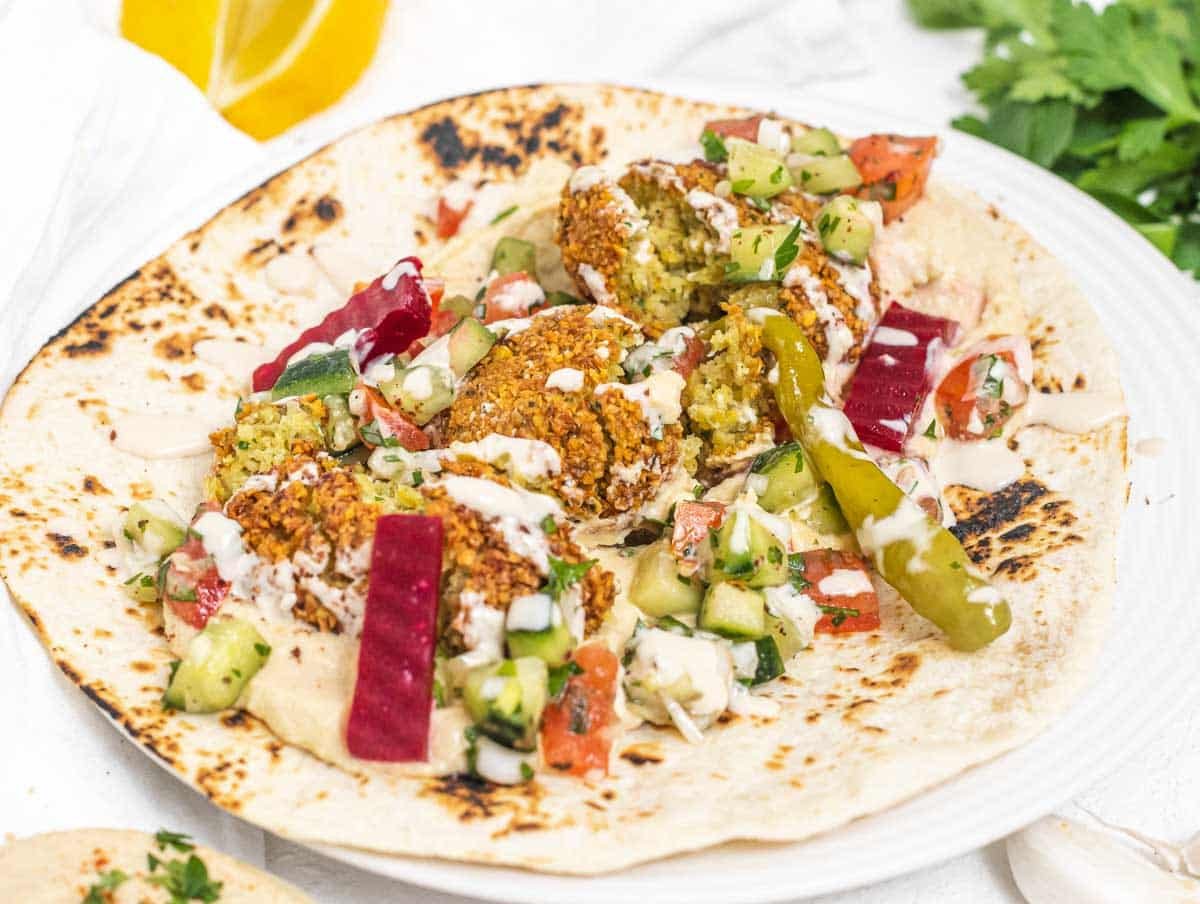Tahini sauce is a creamy, nutty, healthy condiment from Mediterranean and Middle Eastern cuisines.
It has a gracefully pourable consistency and a gorgeous, velvety-smooth texture.
You’ll love it as a salad dressing, dip, or drizzle on your favorite Mediterranean meal.

Table of Contents
Dietary Note: this recipe is suitable for a vegetarian, vegan, and gluten-free diet. It’s low in cholesterol and saturated fats.
Don’t have time to read the full blog post? JUMP TO RECIPE HERE!
What is tahini sauce?

Tahini sauce is a creamy Middle Eastern and Mediterranean condiment made with tahini, fresh lemon juice, water, salt, and crushed garlic.
It’s ridiculously easy to make – whisk everything together – yet it’s creamy, versatile, and nutritious, and it is by far the most popular condiment in our home.
Try it with hummus, warm pita bread, and falafel, or let it drizzle gracefully on chickpea fritters and lentil patties.
Its heavenly creaminess will upgrade any salad, grain bowl, and meze platter.

We recommend it with Shirazi salad, Tabouli, and our Mediterranean bowl for a perfect flavor-texture combination.
Its rich dairy-like mouthfeel (there’s no dairy in it), distinct nuttiness from the sesame seeds, and very slightly bitter undertones balanced by the freshness of the lemon make it a charming and sophisticated addition to your dinner table.
It pours so good you won’t be able to stop!
Ingredients for tahini sauce

Tahini
Tahini, or tahina (طحينة in Arabic), is a sesame seed paste with a rich, nutty flavor and a creamy texture.
It’s used as a condiment, usually mixed or diluted with other ingredients, in most countries in the Levant and Easter-Mediterranean regions and some North African countries.
To make the best tahini sauce, use tahini with a light beige, sandy color, and a smooth, pourable texture.
Avoid dark, pasty, and gritty tahini, as those are often bitter and not authentic.
When buying tahini, read the ingredients list. Good-quality tahini should be made with 100% hulled sesame seeds, and no other ingredients should appear on the label.
You can find high-quality tahini in ethnic food stores; Middle Eastern or Asian grocery stores are your best bet.
Some supermarkets also keep imported tahini from Eastern Mediterranean countries like Lebanon, Turkey, and Israel. Those are usually the best!

We tell you all this because we bought the “wrong” tahini for years. One that was pasty, dark, gritty, and bitter.
Learning what to look for when buying tahini was the biggest game-changer in our Middle Eastern and Mediterranean cooking.
We thought raw, unhulled, organic, and modern packaging were the things to look for. We were so wrong. Go for traditional if you can.
Suddenly, recipes like this easy tahini sauce, hummus, baba ghanoush, falafel, tahini salad, and anything tahini-drizzled made so much sense.
They went from bitter, gritty, and overpowering to silky smooth, lusciously rich, gracefully nutty, and I-want-to-eat-this-thing-with-a-spoon-like-Nutella feeling.
Lemon juice
We recommend freshly squeezed lemon juice.
Garlic
Garlic should be crushed, not grated or minced.
The garlic flavor in tahini sauce is mild, and the sauce should be smooth; that’s why crushed garlic is preferable to grated garlic.
The crushed clove infuses the tahini sauce with a mild garlic flavor without affecting its texture. If you grate the garlic in it, you will get a gritty tahini sauce, which is not ideal.
Salt
We recommend sea salt or kosher salt.
Water
Cold tap water is fine. Take our recipe as a starting point and add more or less water until you reach your desired consistency.
Generally, tahini sauce should be drizzled with a spoon, but you can make it thicker or thinner based on your preference.
Note: Although less traditional, you can customize your basic tahini sauce with herbs and spices.
You can make variations with small quantities of ground cumin, sumac, garlic powder, finely chopped fresh parsley, chives, and fresh mint. Some bloggers even like to add honey or maple syrup and turn it into a tahini dressing.
There is no need to blend the tahini in a food processor. You can make this simple sauce in a small bowl with a whisk in 1 minute.

How to make tahini sauce + Nico’s Tips
Before using your tahini, stir the contents of the bottle or jar with a spoon to mix the sesame oils that might have separated from the sesame paste.
Now, pour the tahini into a medium bowl. Add fresh lemon juice, water, and salt.

Whisk for a minute or until the ingredients turn into a smooth and velvety sauce.
You’ll see the tahini change texture and go from thick to curdle to velvety smooth. The color will also change from beige to light beige.
Tip: The ingredients will curdle at first, and that’s normal. Keep whisking until smooth.

Then add peeled, crushed garlic, stir it in, and let it infuse for 5 to 10 minutes.
Tip: To crush the garlic, use the flat side of your knife’s blade, pressing down with the palm of your hand.
Avoid minced, grated, or pressed garlic because it’ll make your tahini sauce too garlicky and grainy.

Taste and adjust the amount of lemon juice, salt, and water to suit your preferences.
Remember that the sauce thickens slightly as it sits, so if you make it ahead, you might need to stir in more water when you serve it.

How to serve tahini sauce?
Tahini sauce pairs well with most veggies, legumes, salads, and grains.
We make a fresh batch every week, as having it ready in the fridge is handy. Here are some of our favorite pairings:
Hummus

Did you know that you can drizzle hummus with tahini sauce? It’ll change your life!
Here’s the hummus recipe and the pita bread recipe to dip.
Falafel

Drizzle tahini sauce on freshly made falafel served on hummus and get transported to the Middle East.
This is one of the best flavor combinations; we are sure you’ll love it.
Here’s our easy falafel recipe.
Cauliflower

Cauliflower and tahini are simply delicious together. These are our favorite cauliflower recipes to serve with a generous drizzle of tahini sauce:
Eggplant

Like cauliflower, eggplant craves tahini sauce! Drizzle plenty of tahini sauce on:
Roasted vegetables

Okay, maybe we have a tahini sauce obsession and need an intervention, but we honestly love drenching most roasted vegetables in it.
- Roasted carrots
- Roasted zucchini
- Roasted potatoes
- Mix roasted vegetables.
- Stuffed bell peppers
- Smashed potatoes
Bowls

Sandwiches

It’s a healthy and tasty sauce that works well in sandwiches, too. It also goes well with most vegetables and spreads, so experiment with your favorite combinations.
Wraps

If you want to try it in a wrap, we recommend a tangy and refreshing shirazi salad over a bed of hummus and topped with mashed falafel and pickled onions or beets.
Drizzle plenty of the tahini sauce on top, and you are in for a treat!
Dip

You can also use it as a tasty and healthy dip to replace mayonnaise, queso, or sour cream.
It’s delicious with oven-roasted or air-fried potatoes and fantastic with raw veggie sticks.
Salads

Tip
If there’s one thing we’d like you to take away from this blog post is this:
“Source tahini made from hulled sesame seeds and light in colour, and typically made in the Levant region in countries such as Lebanon or Palestine. Avoid unhulled sesame pastes that are dark and gritty. We can’t stress enough how important it is to seek out authentic tahini. The key to creamy dreamy is in the tahini, really.”
Yotam Ottolenghi and Noor Murad, Ottolenghi Test Kitchen: Shelf Love: Recipes to Unlock the Secrets of Your Pantry, Fridge, and Freezer: A Cookbook. Page 19.
Variations
Yogurt tahini sauce

Add a few tablespoons of Greek yogurt to tahini sauce to make a ravishing yogurt tahini sauce.
Here’s our recipe for yogurt tahini sauce.
Questions
Yes. We recommend refrigerating tahini once opened because sesame oils become rancid at room temperature after a while, especially if you live in warm climates.
You can refrigerate tahini for 5 to 6 months.
The only downside of cold tahini is that it’s harder to handle and stir. If that’s the case for your tahini, take it from the refrigerator 10 minutes before using it, and mix well with a spoon.
Tahini and peanut butter taste different as tahini is made from sesame seeds, while peanut butter is made from peanuts.
However, like most seed and nut butters, they have a rich, sticky, and silky texture and similar macronutrient (fats, carbs, and protein) content.
Thanks to the sesame seeds in the tahini, the tahini sauce is wholesome and nutritious. It is rich in calcium, magnesium, iron, phosphorus, and protein, and it contains good heart-healthy mono- and poly-unsaturated fats to keep you satiated and energized throughout the day.
Storage
Make ahead: Tahini sauce can be made up to four days ahead and keeps well in the fridge. After 24 hours, it starts to thicken, so you might have to add a dash of water to make it drizzleable again.
Refrigerator: Store in a sealed jar in the fridge for up to 5 days. Stir well before serving. After a few days, you might want to add a squeeze of fresh lemon juice or a dash of water to thin it up.
Freezer: To freeze tahini sauce, transfer it to ice cube trays and freeze it for up to 6 months. Thaw in the refrigerator overnight.

Similar recipes
For more ideas, take a peek at our selection here:
Tahini Sauce Video Recipe

Tahini Sauce
Ingredients
- ⅓ cup tahini made with 100% hulled sesame seeds, light-colored, and pourable – not thick
- ⅓ cup water add more if necessary to reach your desired consistency
- 2 tablespoons lemon juice
- 1 clove garlic peeled and crushed
- ¼ teaspoon sea salt or more to taste
Instructions
- Stir the content of your tahini jar with a spoon to mix the sesame oils that might have separated from the sesame paste.To a bowl, add ⅓ cup tahini, ⅓ cup water, 2 tablespoons lemon juice, and ¼ teaspoon sea salt.Whisk for about a minute. The sauce will curdle at first; that's normal. Keep whisking until smooth.
- Add 1 clove garlic, peeled and crushed. Stir it in, and let it infuse the sauce for 5 to 10 minutes.
- Taste and adjust the amount of lemon juice, salt, and water to suit your preferences.
- Serve with hummus, pita, and falafel. For more serving ideas, here's our "serving suggestions" chapter.





Where did you but your t tahini
Hi Crystal,
Thanks for your message. It depends. This one was from our small local grocery store. Other times we get it from small Asian/Ethnic stores, on Amazon, or in larger stores like Walmart.
What’s important is that it’s beige/sandy colored and with a pourable consistency.
I hope this helps.
Nico
Can I make my own tahini paste without oil?
What if I add toasted sesame seeds to my chick peas, lemon juice and water in making hummus in the Vitamix will that be in a sense like tahini?
Hi Cindy,
Thank you for your comment. Homemade tahini paste is not a recipe we have tested yet, so we’re not able to advise on that.
However, I see some oil-free tahini recipe ideas when I do a quick Google search from the “Simple Veganista” and “Vegan with Gusto” that I’d recommend to check out.
I hope this helps. All the best,
Louise